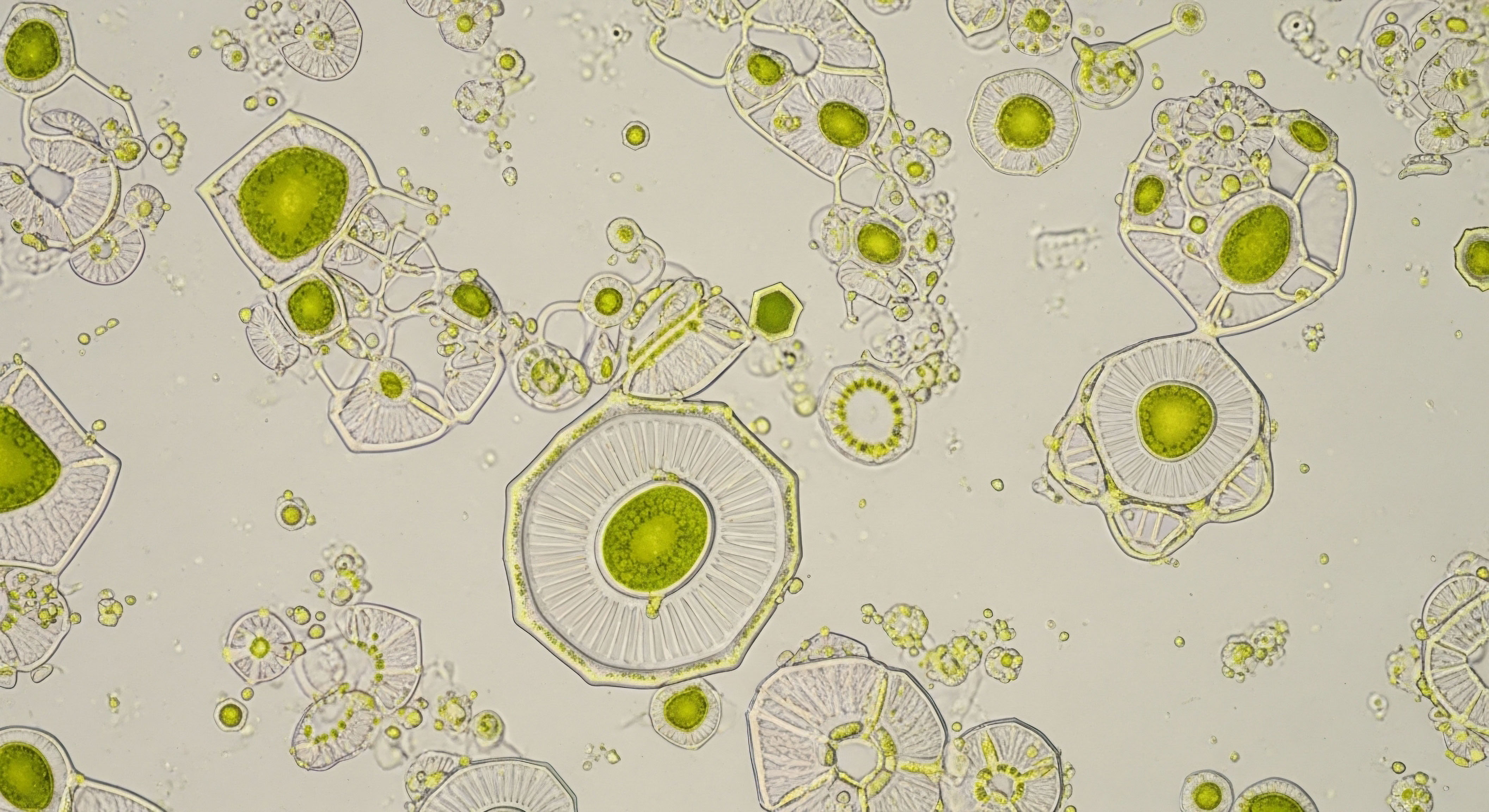

Fundamentals
Have you ever found yourself grappling with persistent fatigue, unexplained shifts in mood, or a subtle but undeniable change in your body’s rhythm? Perhaps your sleep patterns feel disrupted, or your energy levels fluctuate unpredictably throughout the day. These experiences, often dismissed as simply “getting older” or “stress,” frequently point to a deeper, more intricate biological conversation happening within your system.
Your body communicates through a complex network of chemical messengers, and when these signals become muddled, the impact on your daily vitality can be profound. Understanding these internal dialogues is the first step toward reclaiming a sense of balance and well-being.
The intricate connection between your gut and your hormonal health is a prime example of this internal communication. Many individuals experience symptoms that appear to be solely hormonal, yet the underlying cause can often be traced back to the microscopic world residing within their digestive tract.
This community of microorganisms, collectively known as the gut microbiome, plays a far more expansive role than merely aiding digestion. It acts as a silent partner in countless physiological processes, including the delicate regulation of your endocrine system.
Consider the feeling of sluggishness or the difficulty in maintaining a stable weight, even with consistent effort. These sensations might stem from an imbalance in how your body processes and eliminates certain hormones. The gut microbiome influences this process significantly. When the microbial community is thriving and diverse, it supports efficient hormonal clearance. Conversely, a disrupted gut environment can impede these vital functions, leading to an accumulation of hormones that can contribute to a spectrum of unwelcome symptoms.
The concept of the estrobolome illustrates this connection with particular clarity. This term refers to the collection of gut bacteria and their genes that are specifically involved in metabolizing and modulating the body’s circulating estrogen levels. Estrogen, a hormone vital for many bodily functions in both men and women, undergoes a complex journey through the body.
After being produced, it is processed by the liver and then sent to the gut for excretion. However, certain bacteria in the gut produce an enzyme called beta-glucuronidase. This enzyme can “unpackage” estrogen that the liver prepared for removal, allowing it to be reabsorbed back into the bloodstream.
When beta-glucuronidase activity is too high, an excessive amount of estrogen can recirculate, potentially leading to symptoms associated with estrogen dominance. These symptoms might include mood fluctuations, breast tenderness, irregular menstrual cycles, or even difficulty with weight management. Conversely, if the estrobolome is not functioning optimally, it could affect the proper elimination of estrogen, contributing to similar imbalances. A balanced estrobolome ensures that estrogen levels remain within a healthy range, supporting overall hormonal equilibrium.
The gut microbiome, particularly the estrobolome, profoundly influences hormonal balance by regulating the metabolism and recirculation of estrogens within the body.
The gut’s influence extends beyond estrogen. The microbial inhabitants also play a part in the synthesis and regulation of various other hormones and neurotransmitters. For instance, a significant portion of the body’s serotonin, a neurotransmitter that helps regulate mood, is produced in the gut. This intricate communication system, often called the gut-brain axis, means that imbalances in your gut can send signals that affect your mood, stress response, and even cognitive function.
Understanding these foundational biological concepts empowers you to see your symptoms not as isolated issues, but as signals from an interconnected system. By addressing the health of your gut microbiome, you are not merely supporting digestion; you are engaging with a fundamental regulator of your hormonal landscape, laying the groundwork for improved vitality and a more harmonious internal environment. This perspective shifts the focus from simply managing symptoms to addressing root causes, offering a path toward genuine, lasting well-being.


Intermediate
Moving beyond the foundational understanding of the gut-hormone connection, we now consider specific strategies for supporting hormonal balance through targeted microbial interventions. The deliberate introduction of beneficial microorganisms, known as probiotics, represents a sophisticated approach to recalibrating the internal environment. These living microbes, when administered in adequate amounts, confer a health benefit to the host, extending their influence far beyond the digestive tract.

Selecting Probiotic Strains for Hormonal Support
The efficacy of probiotics is highly strain-specific, meaning that different bacterial strains exert distinct effects within the body. For hormonal support, research points to particular genera and species that demonstrate promising interactions with the endocrine system. The most commonly studied and utilized strains for this purpose belong to the Lactobacillus and Bifidobacterium genera.
Certain Lactobacillus strains, such as Lactobacillus acidophilus, Lactobacillus reuteri, and Lactobacillus rhamnosus, have shown an ability to influence estrogen metabolism. These strains can help modulate the activity of beta-glucuronidase, the enzyme responsible for reactivating conjugated estrogens in the gut. By potentially reducing excessive beta-glucuronidase activity, these probiotics may support the proper elimination of estrogen, preventing its reabsorption and contributing to a more balanced hormonal profile.
Similarly, Bifidobacterium species, including Bifidobacterium longum and Bifidobacterium lactis, contribute to a healthy gut environment that indirectly supports hormonal regulation. These bacteria are known for their capacity to produce short-chain fatty acids (SCFAs) like butyrate, propionate, and acetate. SCFAs play a crucial role in maintaining gut barrier integrity, reducing systemic inflammation, and influencing metabolic pathways that are intimately linked with hormonal health, such as insulin sensitivity.
The interplay between gut health and insulin sensitivity is particularly relevant for hormonal balance. Conditions like Polycystic Ovary Syndrome (PCOS), characterized by hormonal imbalances and insulin resistance, often present with altered gut microbiota. Specific probiotic interventions, especially those combining Lactobacillus and Bifidobacterium strains, have demonstrated improvements in insulin sensitivity, reductions in testosterone levels, and more favorable hormonal profiles in women with PCOS. This suggests that by improving metabolic function, probiotics can indirectly alleviate hormonal dysregulation.
Targeted probiotic strains, particularly from the Lactobacillus and Bifidobacterium genera, can support hormonal balance by modulating estrogen metabolism and improving metabolic health.

How Probiotics Influence Hormonal Pathways
The mechanisms through which probiotics exert their hormonal effects are multifaceted. Beyond directly influencing estrogen metabolism via the estrobolome, they communicate with the endocrine system through several channels ∞
- Neurotransmitter Production ∞ Gut bacteria produce neurotransmitters like serotonin and gamma-aminobutyric acid (GABA), which influence mood, stress response, and can indirectly affect the hypothalamic-pituitary-gonadal (HPG) axis, a central regulator of reproductive hormones.
- Inflammation Modulation ∞ A healthy gut microbiome helps reduce systemic inflammation. Chronic low-grade inflammation can disrupt hormonal signaling and contribute to conditions like insulin resistance. Probiotics can strengthen the gut barrier, reducing the entry of inflammatory compounds into the bloodstream.
- Metabolic Regulation ∞ Probiotics influence the production of SCFAs, which impact glucose metabolism, insulin sensitivity, and appetite-regulating hormones such as glucagon-like peptide-1 (GLP-1) and peptide YY (PYY). Improved metabolic health directly supports hormonal equilibrium.
- Detoxification Support ∞ By promoting a balanced gut environment, probiotics aid the body’s natural detoxification processes, ensuring efficient removal of excess hormones and metabolic byproducts.
For individuals undergoing hormonal optimization protocols, such as Testosterone Replacement Therapy (TRT) for men or women, or Growth Hormone Peptide Therapy, maintaining optimal gut health can be a supportive strategy. A well-functioning gut microbiome can help ensure the body efficiently processes and utilizes these exogenous hormones or peptides, potentially optimizing their effects and mitigating unwanted side effects related to metabolic or inflammatory responses.
Consider the case of TRT in men. While the primary goal is to restore testosterone levels, the body’s overall metabolic health influences how testosterone is metabolized and utilized. A healthy gut can support liver function and reduce inflammation, both of which are important for efficient hormone processing. Similarly, for women on low-dose testosterone or progesterone, a balanced gut contributes to systemic well-being, which can enhance the overall effectiveness of these hormonal interventions.

Probiotic Strains and Their Potential Hormonal Associations
| Probiotic Strain | Primary Hormonal/Metabolic Association | Proposed Mechanism |
|---|---|---|
| Lactobacillus acidophilus | Estrogen metabolism, gut barrier integrity | Modulates beta-glucuronidase activity, supports healthy gut lining. |
| Lactobacillus reuteri | Estrogen metabolism, skin health | Influences estrobolome activity, may support healthy estrogen ratios. |
| Lactobacillus rhamnosus | Mood, stress response, metabolic health | Impacts gut-brain axis, influences neurotransmitter production, improves insulin sensitivity. |
| Bifidobacterium longum | Stress reduction, metabolic parameters | Reduces cortisol, produces SCFAs, improves lipid metabolism and insulin sensitivity. |
| Bifidobacterium lactis | Insulin sensitivity, gut barrier function | Enhances SCFA production, reduces inflammation, supports glucose metabolism. |
| Saccharomyces boulardii | Gut flora balance, inflammation | Yeast-based probiotic, supports overall gut health, indirectly aids hormonal balance by reducing dysbiosis. |
The integration of specific probiotic strains into a personalized wellness protocol should always be considered within the broader context of an individual’s unique biological landscape. This involves assessing existing symptoms, reviewing relevant laboratory markers, and understanding dietary and lifestyle factors. The goal is to create a synergistic approach where targeted microbial support complements other strategies aimed at optimizing hormonal and metabolic function.

Can Probiotics Influence Male Hormonal Health?
While much of the discussion around probiotics and hormones often centers on female health, the male endocrine system also stands to benefit from a balanced gut microbiome. Testosterone, the primary male sex hormone, is influenced by various factors, including metabolic health, inflammation, and the gut-brain axis.
Studies indicate that gut microbiota can influence testosterone levels. For instance, some research suggests that certain probiotic strains, particularly from the Lactobacillus and Bifidobacterium genera, may contribute to reductions in total testosterone levels in some populations, while improving overall hormonal profiles. This might occur through mechanisms related to improved insulin sensitivity, which can reduce ovarian androgen production in women and potentially influence sex hormone-binding globulin (SHBG) levels in both sexes, thereby affecting free testosterone.
Beyond direct hormonal modulation, the general benefits of probiotics ∞ such as reducing systemic inflammation and supporting metabolic health ∞ are universally applicable. For men experiencing symptoms of low testosterone or those on TRT, a healthy gut can contribute to overall vitality, energy levels, and a more balanced inflammatory state, which are all supportive of optimal hormonal function. The intricate web of biological systems means that improving one area, such as gut health, often creates positive ripple effects throughout the entire body.


Academic
The profound interplay between the gut microbiome and the endocrine system represents a frontier in precision health. To truly appreciate the mechanisms by which specific probiotic strains support hormonal balance, a deeper exploration into the molecular and cellular dialogues occurring within the body is essential. This requires examining the intricate biochemical pathways and feedback loops that govern hormone synthesis, metabolism, and action.

The Estrobolome and Estrogen Recirculation
The concept of the estrobolome is central to understanding the gut’s influence on estrogen dynamics. Estrogens, primarily synthesized in the ovaries, adrenal glands, and adipose tissue, undergo a two-phase detoxification process in the liver. In Phase II, estrogens are conjugated with glucuronic acid or sulfate, rendering them water-soluble and ready for excretion via bile into the intestinal lumen. These conjugated estrogens are biologically inactive.
Within the gastrointestinal tract, a subset of gut bacteria produces enzymes, predominantly beta-glucuronidase (GUS). These bacterial GUS enzymes possess the remarkable ability to deconjugate estrogens, cleaving the glucuronic acid moiety and reactivating the estrogen molecule. Once deconjugated, these now active estrogens can be reabsorbed through the intestinal wall and re-enter the systemic circulation via the enterohepatic pathway.
An elevated activity of bacterial beta-glucuronidase can lead to an increased reabsorption of estrogens, potentially contributing to higher circulating levels of unbound estrogen. This phenomenon has been implicated in conditions associated with estrogen dominance, including certain hormone-sensitive cancers and gynecological disorders. Conversely, a healthy, diverse estrobolome with balanced GUS activity ensures that excess estrogens are efficiently eliminated, preventing their undue recirculation.
Specific probiotic strains, particularly those from the Lactobacillus and Bifidobacterium genera, have been investigated for their capacity to modulate GUS activity. While direct clinical evidence on specific strains consistently reducing GUS activity in humans is still developing, the theoretical basis suggests that by promoting a healthy microbial balance, these probiotics can indirectly influence the overall enzymatic environment within the gut, thereby supporting optimal estrogen detoxification and excretion.
Bacterial beta-glucuronidase activity within the gut dictates the reabsorption of estrogens, a process probiotic strains can influence to support hormonal equilibrium.

Gut-Brain-Endocrine Axis Communication
The influence of the gut microbiome extends beyond direct hormonal metabolism to encompass complex neuroendocrine signaling pathways. The gut-brain axis, a bidirectional communication network, links the central nervous system with the enteric nervous system. This communication involves neural pathways (like the vagus nerve), endocrine signals (hormones), and immune system activity (cytokines).
The gut microbiota plays a significant role in modulating the hypothalamic-pituitary-adrenal (HPA) axis, the body’s central stress response system. Dysbiosis, an imbalance in the gut microbial community, can alter HPA axis activity, leading to increased cortisol levels.
Chronic elevation of cortisol can disrupt the delicate balance of other hormones, including sex hormones and thyroid hormones, impacting overall endocrine function. Probiotic strains like Lactobacillus helveticus R0052 and Bifidobacterium longum R0175 have shown promise in reducing stress-induced cortisol responses, thereby indirectly supporting hormonal stability.
Furthermore, gut bacteria produce a wide array of metabolites, including SCFAs and various neurotransmitters. SCFAs, such as butyrate, propionate, and acetate, are crucial for maintaining gut barrier integrity and can influence host metabolism by activating specific receptors on enteroendocrine cells, leading to the release of hormones like GLP-1 and PYY. These hormones regulate glucose homeostasis and appetite, which are intrinsically linked to insulin sensitivity and, by extension, to the balance of sex hormones.
The production of neurotransmitters like serotonin and GABA by gut microbes directly impacts mood and psychological well-being. Given the intimate connection between psychological stress and hormonal dysregulation, probiotics that support a healthy gut-brain axis can indirectly contribute to a more stable hormonal environment. This holistic perspective underscores that hormonal health is not an isolated system but rather a reflection of the body’s interconnected biological processes.

Probiotic Mechanisms in Hormonal and Metabolic Regulation
The mechanisms by which probiotics exert their beneficial effects on hormonal and metabolic health are diverse and often synergistic. They involve direct interactions with host cells, modulation of microbial metabolites, and indirect effects on systemic physiology.
- Modulation of Gut Microbiota Composition ∞ Probiotics can shift the balance of microbial populations, increasing the abundance of beneficial bacteria while suppressing potentially harmful ones. This rebalancing can lead to a healthier microbial ecosystem that supports optimal metabolic and hormonal functions.
- Enhancement of Gut Barrier Integrity ∞ A healthy gut lining prevents the translocation of bacterial toxins (like lipopolysaccharides or LPS) into the bloodstream. LPS can trigger systemic inflammation, which impairs insulin signaling and disrupts hormonal balance. Probiotics strengthen the intestinal barrier, reducing this inflammatory burden.
- Production of Short-Chain Fatty Acids (SCFAs) ∞ As discussed, SCFAs are crucial signaling molecules. They influence glucose and lipid metabolism, enhance insulin sensitivity, and modulate the release of gut hormones that regulate appetite and energy expenditure.
- Reduction of Systemic Inflammation ∞ Many probiotic strains possess anti-inflammatory properties, reducing pro-inflammatory cytokines and enhancing anti-inflammatory mediators. Lowering chronic inflammation is vital for maintaining hormonal sensitivity and preventing metabolic dysfunction.
- Influence on Neurotransmitter Synthesis ∞ Specific probiotic strains can influence the production of neurotransmitters within the gut, impacting the gut-brain axis and, consequently, stress responses and mood, which have downstream effects on hormonal regulation.
- Direct Enzyme Modulation ∞ Beyond beta-glucuronidase, gut microbes produce a range of enzymes that participate in the metabolism of various compounds, including hormones and xenobiotics. Probiotics can influence the activity of these enzymes, contributing to more efficient detoxification and hormonal clearance.
The complexity of these interactions means that identifying the “best” probiotic strains for hormonal support is not a one-size-fits-all endeavor. It requires a personalized approach, considering the individual’s unique microbiome composition, hormonal profile, metabolic status, and specific health concerns. Clinical trials continue to shed light on strain-specific effects, but the overarching principle remains ∞ a healthy, diverse gut microbiome is a fundamental pillar of endocrine well-being.

Clinical Implications and Future Directions
The growing body of research on the gut-hormone axis opens new avenues for therapeutic interventions. For individuals experiencing hormonal imbalances, whether related to perimenopause, andropause, PCOS, or other conditions, addressing gut health with targeted probiotic strategies can be a valuable adjunct to conventional approaches.
For instance, in the context of Testosterone Replacement Therapy (TRT) for men, optimizing gut health could theoretically enhance the body’s response to exogenous testosterone by improving metabolic efficiency and reducing inflammation, which can otherwise impede hormone receptor sensitivity. Similarly, for women utilizing low-dose testosterone or progesterone, a robust gut microbiome supports overall systemic health, creating a more receptive environment for hormonal recalibration.
The precise mechanisms through which different probiotic strains modulate these hormones remain an active area of investigation. Future research will likely focus on identifying optimal dosages, specific strain combinations, and the long-term effects of probiotic supplementation on various hormonal parameters. The goal is to move towards even more precise, microbiome-based interventions that can be tailored to an individual’s unique biological needs, offering a truly personalized path to hormonal vitality.
What specific biomarkers indicate a need for probiotic intervention in hormonal health?

References
- Ervin, S. M. et al. “The human gut microbiome regulates estrogen metabolism through the ‘estrobolome,’ the collection of bacterial genes that encode enzymes like β-glucuronidases and β-glucosidases.” Journal of Clinical Endocrinology & Metabolism, vol. 104, no. 5, 2019, pp. 1381-1391.
- Baker, J. M. et al. “Estrogen metabolism and the gut microbiome.” Steroids, vol. 136, 2017, pp. 41-45.
- Plottel, C. S. and M. J. Blaser. “Microbiome and malignancy.” Cell Host & Microbe, vol. 10, no. 4, 2011, pp. 324-335.
- Zhang, J. et al. “Probiotic Bifidobacterium lactis V9 regulates the secretion of sex hormones in polycystic ovary syndrome patients through the gut-brain axis.” mSystems, vol. 4, no. 2, 2019, e00017-19.
- Messaoudi, M. et al. “Assessment of psychotropic-like properties of a probiotic formulation (Lactobacillus helveticus R0052 and Bifidobacterium longum R0175) in rats and human subjects.” British Journal of Nutrition, vol. 105, no. 5, 2011, pp. 755-764.
- Szulińska, M. et al. “Effects of probiotics supplementation on the hormone and body mass index in perimenopausal and postmenopausal women using the standardized.” Nutrients, vol. 12, no. 1, 2020, pp. 26-38.
- Cryan, J. F. and T. G. Dinan. “Mind-altering microorganisms ∞ the impact of the gut microbiota on brain and behaviour.” Nature Reviews Neuroscience, vol. 13, no. 10, 2012, pp. 701-712.
- Sivamaruthi, B. S. et al. “Probiotics as modulators of gut-brain axis for cognitive development.” Frontiers in Pharmacology, vol. 15, 2024, p. 1357648.
- Mohammadi, S. et al. “The role of probiotics in managing premenstrual syndrome ∞ insights into beneficial bacterial strains.” Journal of Obstetrics and Gynaecology Research, vol. 50, no. 1, 2024, pp. 10-18.
- Rastogi, A. et al. “Effectiveness of Probiotics, Prebiotics, and Synbiotics in Managing Insulin Resistance and Hormonal Imbalance in Women with Polycystic Ovary Syndrome (PCOS) ∞ A Systematic Review of Randomized Clinical Trials.” Nutrients, vol. 16, no. 1, 2024, p. 123.

Reflection
As you consider the intricate connections between your gut microbiome and your hormonal health, a deeper understanding of your own biological systems begins to take shape. This exploration is not merely about absorbing scientific facts; it is an invitation to engage with your body’s profound intelligence. The journey toward optimal vitality is deeply personal, reflecting the unique symphony of your internal environment.
Recognizing the subtle signals your body sends ∞ the shifts in energy, the changes in mood, the persistent discomfort ∞ is a powerful act of self-awareness. Each symptom holds a message, a clue pointing toward areas that may benefit from support and recalibration.
The insights shared here about probiotic strains and their influence on hormonal pathways are not prescriptive mandates, but rather guiding principles. They illuminate a path where understanding your biology becomes the key to unlocking your inherent capacity for well-being.
Your path to reclaiming vitality is a collaborative effort, one that involves listening to your body, seeking informed guidance, and making choices that honor your unique physiological needs. This knowledge serves as a foundation, empowering you to ask more precise questions and to participate actively in shaping your personalized wellness protocol.
The pursuit of health is a continuous unfolding, a dynamic process of learning and adapting, always with the goal of supporting your body’s innate ability to function with balance and resilience.



